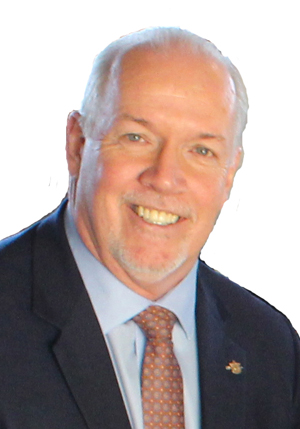Thursday, November 21, 2019 ~ VICTORIA
by Mary P Brooke ~ West Shore Voice News
Today November 21 Premier John Horgan addressed media on a range of questions about the week’s issues. This sort of open media scrum is generally held weekly while the BC Legislative Assembly is in session.
This fall’s session in the legislature has been relatively short, punctuated with long weekends for Thanksgiving and Remembrance Day. The parliamentary calendar shows the legislature in session for five four-day weeks (Monday to Thursday) in October and November 2019: October 7 to 10, October 21 to 24, October 28 to 31, November 18 to 21 and November 25 to 28. That’s 20 days for dealing with legislation before breaking for the Christmas holiday season.
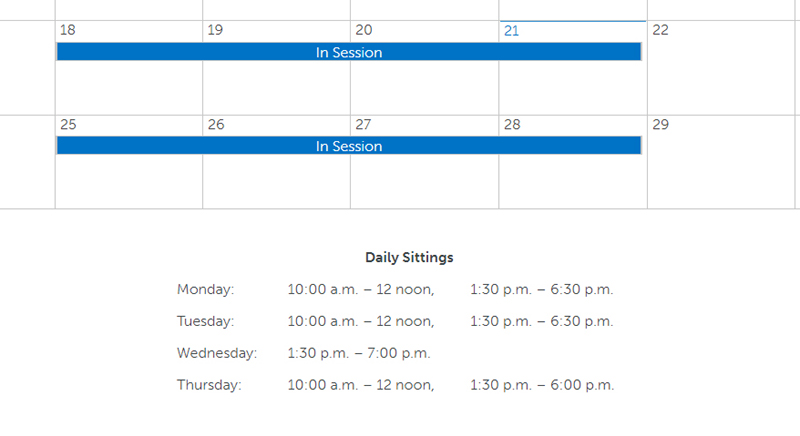
“We’ve addressed 80% of the commitments we made (in the 2017 election campaign),” said Horgan today, as a way to reinforce the progress of his NDP government that is supported under a confidence and supply agreement with the BC Greens. “Be patient and we’ll clean up that last 20%,” he told media.
Most media questions today had to do with resolving the transit labour strike in Vancouver, as well as bringing in ride sharing to BC, challenges with ICBC rates, speaking up against conversion therapy, moving the province to permanent daylight savings time, the cost of gasoline in BC, and addressing consumer concerns over the transparency and fairness of mobile phone billings.
In the 30-minute media session at the legislature (available by teleconference) Horgan reiterated how labour disputes are best resolved at the bargaining table and hopes for the sake of transit users in the Lower Mainland Greater Vancouver area that the BC Transit strike is addressed this coming weekend. Ridership in the metro Vancouver area has increased seven percent and reached record levels last year. He urged Coast Mountain Bus and Unifor to get back to bargaining.
On the issue of ride sharing that sees Vancouver (and BC overall) one of the last major cities in North America to embrace services like Uber and Lyft, Premier Horgan said he is “encouraged by the number of companies who have expressed interest”. He sees ride sharing being “up and running very soon”.
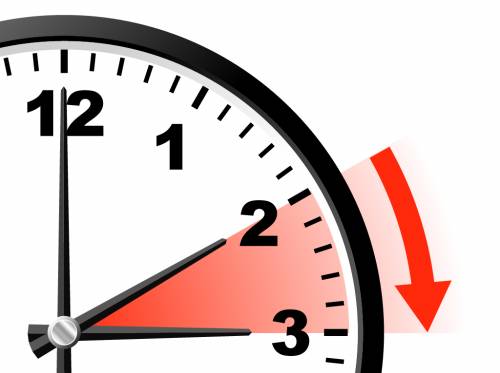
Horgan says he has asked all provincial premiers to look at the idea of a non-changing time zone for their provinces across Canada. BC is considering a move to permanent use of daylight savings time (seven hours behind UTC) commencing with the spring-forward of clocks by one hour in March 2020. BC would then stay on ‘Pacific Time’. That’s in large part to line up with the three American states of Washington, Oregon and California that are to the south of BC, as a way of better coordinating the business world in this side of North America.
On the matter of the automobile insurance provider ICBC, Premier Horgan says his government is looking at “a variety of steps to rein in costs” for drivers. The effort to reduce court costs was “unsuccessful in this round” and that it would “not be fair to say that we were on the wrong track”, Horgan told media. “There were some runaway costs that were hidden by the last crew that was in here,” said Horgan, referring to the BC Liberal Government that was in power up to mid 2017.
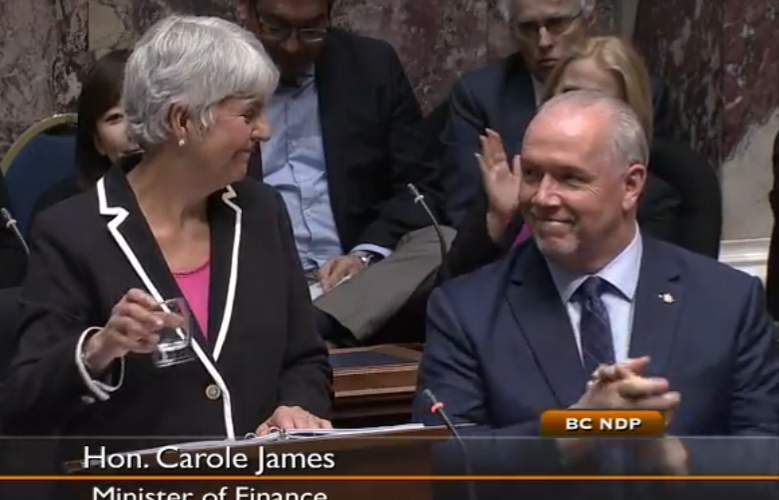
As he has often done in the past few years, Premier Horgan lauded his own good judgement for appointing Victoria MLA Carole James as his finance minister in the NDP government that came into power in July 2017.
Based on the work of Finance Minister Carole James at the helm, Horgan says BC is enjoying job growth “in every corner of the province”.
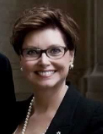
Horgan says he got a thumbs up on provincial budget management from a former finance minister of a different political stripe — Carole Taylor (BC Minister of Finance 2005-2008 under BC Liberal premier Gordon Campbell) — over lunch this week.
This week the BC Government raised a transgender flag outside the Parliament Buildings in Victoria. Horgan said that sort of symbolic gesture will have more power at this point compared to battle legislation on the matter against the BC Liberal opposition, something Horgan thinks at this point would be “divisive”.
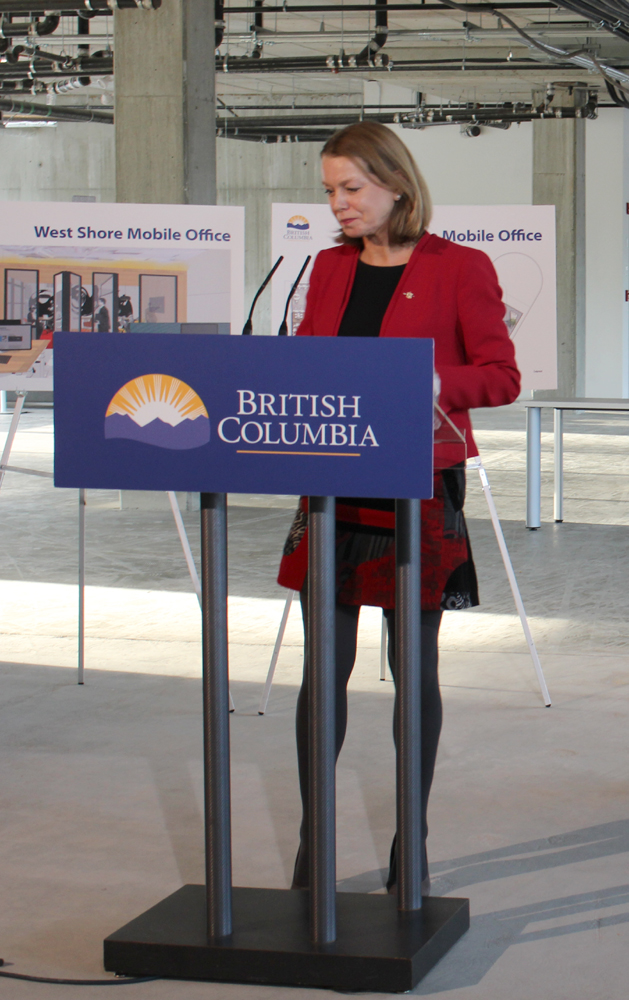
Earlier this week, Premier Horgan together with Mitzi Dean, MLA (Esquimalt-Metchosin) who is Parliamentary Secretary for Gender Equity, issued a joint statement: “As a government, we’re taking steps to make our province safe and welcoming for trans people by affirming, acknowledging and teaching about all gender identities in our schools, providing a non-binary gender option on government identification, improving access to gender-affirming surgeries, and re-establishing a human rights commission to fight inequality and discrimination in all its forms.”
BC’s Health Minister Adrian Dix has already made a statement against conversion therapy in BC. In August the BC government called on the federal government to ban conversion therapy, and Horgan said that’s the approach to follow as opposed to having BC legislation on the matter.
In a tone of repeating what he feels should be understood and known now, Horgan said that swings in the price of gasoline at the pump in BC has nothing to do with any changes in taxes, it’s all about market forces. Horgan said he has again recently discussed with Prime Minister Justin Trudeau and Alberta Premier Jason Kenney that the solution to better control of gasoline pricing in Canada is to increase oil refinery capacity in Canada.

BC Bill 42 (fuel price transparency act) will allow the BC Utilities Commission (BCUC) to collect information from oil and gas companies on the market conditions involved in setting gasoline prices.
“More refined product will keep prices down,” said John Horgan, adding that he’s working to see that the BC Utilities Commission “has the tools they need” to address transparency with gasoline pricing. In a report issued last week (in followup to an August 2019 report), apparently companies still can’t account for a 13-cent gap in BC gas prices.
On the matter of cell phone billing practices, BC “has limited powers” over the telecommunications companies that deliver mobile services. On November 19, Premier John Horgan appointed Maple Ridge-Mission MLA Bob D’Eith to push the federal government for more affordable and transparent cellphone options.
Horgan said that smartphone bills impact almost every person in British Columbia, noting that “all federal parties made passing reference” to the cost of cell phone bills in the recent federal election. Trudeau promised during the election campaign to provide Canadians more relief from their cellphone bills, and the Liberals committed to cutting cellphone bills by 25%.
The BC government recently announced that it has found a vast majority of people don’t find cellphone contracts easy to understand. The finding was part of a public consultation conducted to look at ways to provide greater transparency around cellphone bills. A report based on 15,549 survey responses received between May 29 and July 5, 2019.


